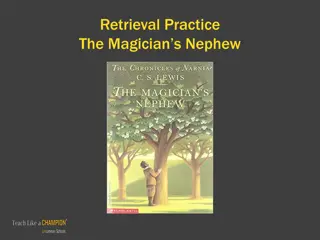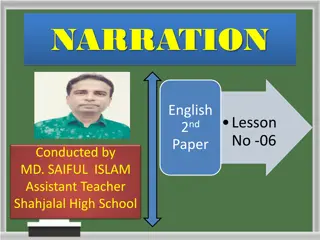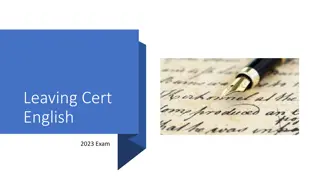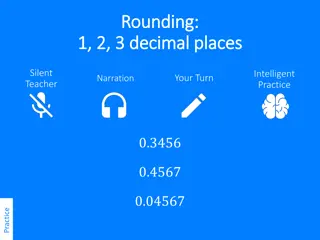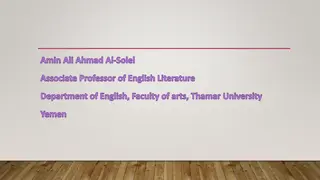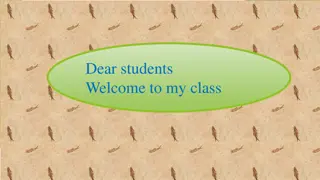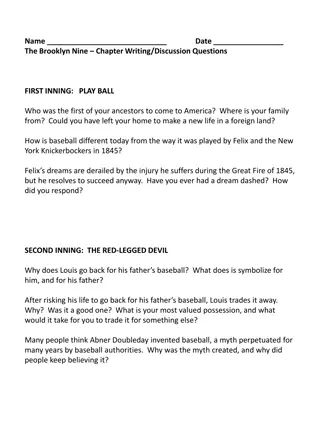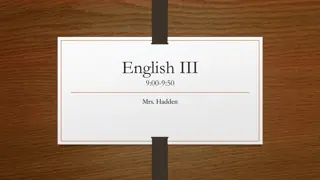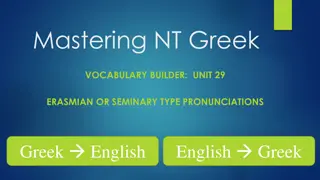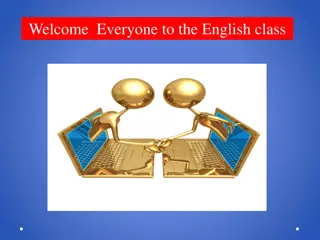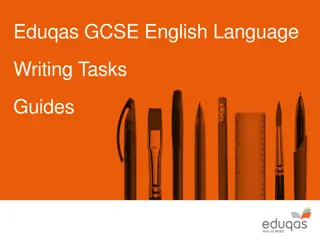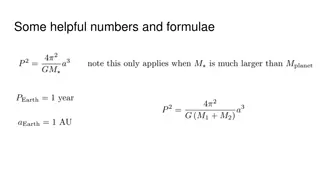Mastering Narration: A Comprehensive Guide for Class Nine English Students
This detailed guide covers the rules and types of narration, along with exercises and real-life applications. Learn about direct and indirect narration, reporting verbs, sentence connectors, changing persons, and more to enhance your English skills effectively.
Download Presentation

Please find below an Image/Link to download the presentation.
The content on the website is provided AS IS for your information and personal use only. It may not be sold, licensed, or shared on other websites without obtaining consent from the author. Download presentation by click this link. If you encounter any issues during the download, it is possible that the publisher has removed the file from their server.
E N D
Presentation Transcript
WELCOME .
MD.ABDUL HAKIM Assistant teacher Bhuksimoil D.U.Alim Madrasha Bhuksimol, Kulaura, Moulovibazar Mobile-01716687136 Email-hakimful78@gmail.com
Topic Narration Narration Class nine Sub: English 2nd Part
Learning Outcomes By the end of the lesson, the learners will be able to 1.Learnt about the rules of Narration. 2.Learnt kinds of narrtion. 3.Practise the exercise of Narration. 4. Apply it in real life.
Narration Direct Narration Indirect Narration Stated by Others Stated by speaker himself
Two parts in narration He said to me, I am fine . Reporting verb Reported Speech For example: He says, I am well . He said, I write a novle . She said, I am going to school . He said, I have done my duty . N.B. Here the sentence outside is called reporting verb and the sentence in comma and inverted comma is called reported speech.
Sentences connectors Use this verb in lieu of reporting verb (said to) Assertive Interrogative told/said asked That If/WH Ordered/requested/advised/forbade/proposed/said To/that Prayed/wished Exclaimed with joy/sorrow/wonder Imperative Optative Exclamatory That that Direct : Abir said to me, He is fine. Indirect : Abir told me that he was fine. Direct : She said to me , Are you reading the book? Indirect : She asked me if I was reading the book. Direct : The teacher said to students, Sit down. Indirect : The teacher ordered the students to sit down.
Direct : Father said to his son, May Allah help you. Indirect : Father prayed to his son that Allah might help him. Direct : The boy said to us, How fine the bird it is! Indirect : The boy exclaimed with joy that it was very fine bird.
Changing person Person Nominative Case Objective Case Possessive Case 1st Person I we You Me us you My Our your 2nd Person He She They It Him Her Them it His Her Their its 3rd Person R.S 1stPerson R.V Speaker Person Change 1. Direct: Direct : Kamal said to me , I am drawing the picture. Indirect : Kamal told me that he was drawing the picture. 2. R.S 2nd Person R.V object Person Change Direct : I said to him, you went market. Indirect : I told him that he had done the work.
3. 3rd Person Change Direct : She said , They are reading a novel. Indirect : She said that they were reading novel.
Changing Tense Direct Narration Present Indefinite Present Continuous Indirect Narration Past Indefinite Past Continuous Present Perfect Present Perfect Continuous Past Indefinite Past Continuous Past Perfect Past Perfect Continuous : He said to me, I go to Dhaka. Past Perfect Past Perfect Continuous Past Perfect Past perfect Continuous No Change No Change Direct Indirect : He told me that he went to Dhaka. : Jamal said to me, I am catching fish. Direct Indirect : Jamal told me that he was catching fish.
Direct : The boy said to her, Are you reading the book? Indirect :The boy asked her if she was reading the book. Direct : The teacher said , Do the work . Indirect : The teacher ordered to do the work . Direct : He says to me, You knew the matter. Indirect : He tells me that I had known the matter.
Chaging Modal Auxilay verb Direct Narration Indirect Narration can may could might shall will must Need Dare should would Had to Needed Dared Direct: The girl said , I will do the work. Indirct : The girl said that she would do the work. Direct: Mother said to her son, May Allah help you. Indirect: Mother prayed her son that Allah might help him. Direct: Mother said to his son, You must take it. Indirect: Mother told his son that he had to take it.
Changing these words in this way Direct Indirect Direct Indirect Here There Thus So Now Ago This Then Before That Tomorrow Yesterday Last night / week / month /year To night Next week The next day The Previous day The Previous night / week /month /year That night The following week These Come Those Go Direct: The boy said to me , I saw him yesterday. Indirect: The boy told me that he had seen him the previous day. Direct: Aunt said to me, When did you go here. Indirect: Aunt asked me when I had gone there. Direct: I said to him, Will you come tomorrow? Indirect: I asked him if he would go the next day.
Exercise Direct: He says, I am student. Indirect: He says that he was student. Direct: Nishat says, I am going to school. Indirect: Nishat says that she was going to school. Direct: Runu will say, She is a good mother. Indirect:Runu will say that she is a good mother. Direct: The teacher said to me, will you go to market? Indirect: The teacher asked me if I should go to market. Direct: Father said to me, Have you written the novel? Indirect: Father asked me if I had written the novel. Direct: The teacher said to me, Always speak the truth. Indirect: The teacher advised me to speak the truth always. Direct: Nahid said, Do not quarrel with him. Indirect: Nahid forbid not to quarrel with him. Direct: He said, Long live our Prime minister. Indirect: He prayed that their president might live long. Direct: Mother said, May Allah help you. Indirect: Mother prayed that Allah might help me. Direct: They said, How beautiful the bird is! Indirect: They exclaimed with joy thatthe bird wasvery beautiful











